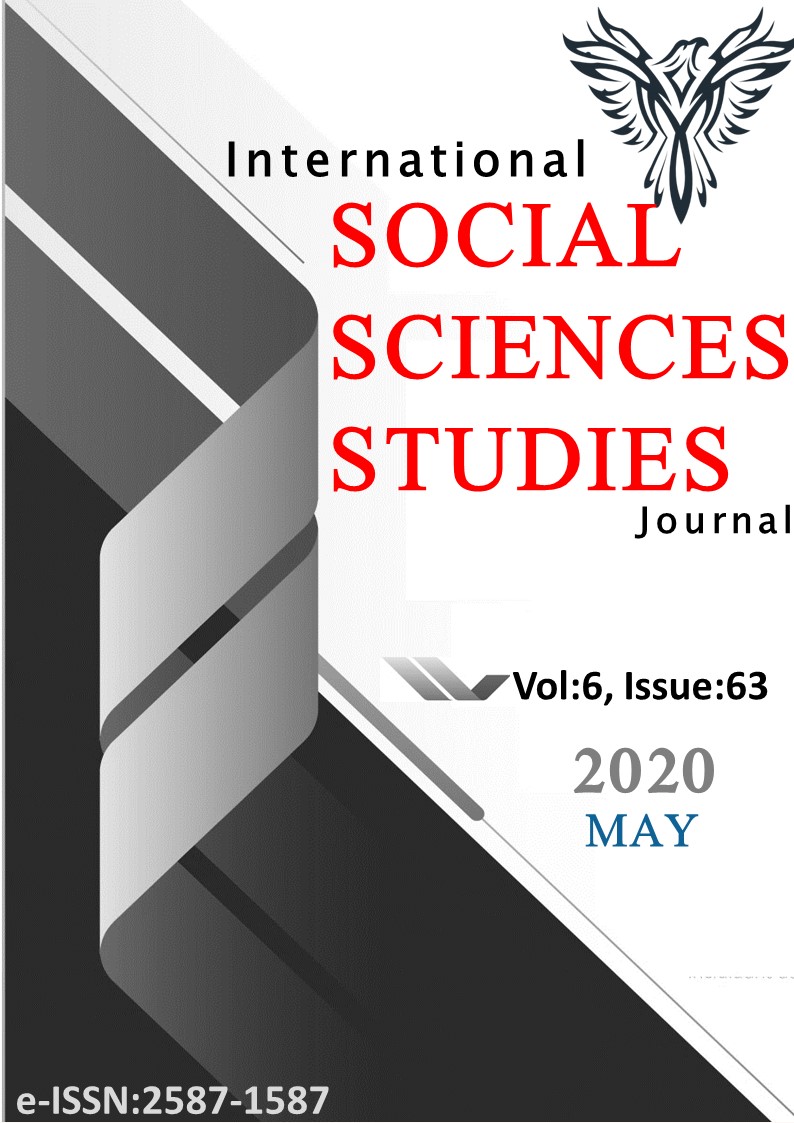Eğitim Yöneticilerinin Değer Eğitimi Uygulamalarına İlişkin Görüşlerinin Çeşitli Değişkenler Açısından İncelenmesi
Author :
Abstract
Bu çalışmanın genel amacı Milli Eğitim Bakanlığı’na bağlı ilk ve ortaokullarda çalışan eğitim yöneticilerinin değerler eğitimi ve uygulamalarına ilişkin görüşlerini ortaya çıkarmaktır. Araştırmanın evrenini, Ordu il merkezinde bulunan ve Milli Eğitim Bakanlığı’na bağlı ilkokul ve ortaokullarda görev yapan eğitim yöneticileri oluşturmaktadır. Bu bağlamda araştırmanın örneklemini, 222 eğitim yöneticisi (66 müdür ve 156 müdür yardımcısı) oluşturmaktadır. Araştırmada verileri toplamak amacıyla Okudan (2010), tarafından geliştirilen “Eğitim Yöneticilerinin Değer Eğitimi Yeterliliklerini Algılama Ölçeği” kullanılmıştır. Yapılan araştırmada eğitim yöneticilerinin değer eğitimi yeterlikleri algıları en yüksekokul dışı çevreyi düzenleme boyutunda; en düşük ise koordine ve karar süreçlerini yürütme boyutunda olduğu tespit edilmiştir. Ayrıca eğitim yöneticilerinin değerler eğitimi yeterlikleri algıları cinsiyet, medeni durum, mezun oldukları okul, makale-kitap okuma, unvan, branş, kıdem, okul türü, okulda etkinlik yapma, mezun olunan fakülte değişkenleri açısından benzerlik gösterirken; değer eğitimine ilişkin Kurs-Seminer Alma Değişkeninin Koordine ve Karar Süreçlerini Yürütme alt boyutunda ve ölçeğin Toplamında evet diyenlerin lehine anlamlı bir farklılık tespit edilmiştir. Okulda lider olan eğitim yöneticilerinin değer eğitimi ve uygulamalarına yönelik eğitim almaları önerilmiştir.
Keywords
Abstract
The general aim of this study is to reveal the opinions of the education managers working in the basic education schools of the Ministry of National Educaiton about values education and practices. The population of the research consists of the education managers in the Ministry of National Education who work in primary schools and secondary schools in the city center of Ordu. In this context, sample of the study was carried out with 222 education managers (66 principals and 156 assistant principals).In order to collect datas in the research, the scale of perceiving value education qualifications of the Education Managers developed by Okudan (2010), was used. As a result of the research, it is detected that education managers’ perceptions of the value education efficacies are the highest level of organizing the outside school environment, on the other hand the lowest is the size of Coordinating and Executing Decision Processes. In addition; it is determined from the research that the efficacy perception of education managers has similarities in terms of variables to some extends such as their marital status, gender, schools they graduated from, reading article-book, degree, branch, seniority, type of school doing activities at school, department they attended; other side, the varient that attending Course-Seminar makes a significant difference in favor of participants who ticked ‘yes’ ,regarding value education, during the subdimension of coordination and decision process and in the total of the scale. Finally, education managers who are leaders at school are suggested to have some education relevant to value education and its applications.
Keywords
- Yediyıldız, M.Y. & Beldağ, A. (2020). “Eğitim Yöneticilerinin Değer Eğitimi Uygulamalarına İlişkin Görüşlerinin Çeşitli Değişkenler
- Açısından İncelenmesi” International Social Sciences Studies Journal, (e-ISSN:2587-1587) Vol:6, Issue: 63; pp:2425-2434 EĞİTİM YÖNETİCİLERİNİN DEĞER EĞİTİMİ UYGULAMALARINA İLİŞKİN GÖRÜŞLERİNİN ÇEŞİTLİ DEĞİŞKENLER AÇISINDAN İNCELENMESİ 1 The Study of The Views Of Education Managers About Values Education and Practices in Terms of Various Variables Uzman. Mehmet Yücel YEDİYILDIZ Milli Eğitim Bakanlığı Fatsa Atatürk İlkokulu, Ordu/TÜRKİYE ORCID ID: https://orcid.org/0000-0002-5281-1548 Doç. Dr. Adem BELDAĞ Recep Tayyip Erdoğan Üniversitesi, Türkçe ve Sosyal Bilimler Eğitimi Bölümü, Rize/TÜRKİYE ORCID ID: https://orcid.org/000-0002-3482-4273 ÖZET Bu çalışmanın genel amacı Milli Eğitim Bakanlığı’na bağlı ilk ve ortaokullarda çalışan eğitim yöneticilerinin değerler eğitimi ve uygulamalarına ilişkin görüşlerini ortaya çıkarmaktır. Araştırmanın evrenini, Ordu il merkezinde bulunan ve Milli Eğitim Bakanlığı’na bağlı ilkokul ve ortaokullarda görev yapan eğitim yöneticileri oluşturmaktadır. Bu bağlamda araştırmanın örneklemini, 222 eğitim yöneticisi (66 müdür ve 156 müdür yardımcısı) oluşturmaktadır. Araştırmada verileri toplamak amacıyla Okudan (2010), tarafından geliştirilen “Eğitim Yöneticilerinin Değer Eğitimi Yeterliliklerini Algılama Ölçeği” kullanılmıştır. Yapılan araştırmada eğitim yöneticilerinin değer eğitimi yeterlikleri algıları en yüksekokul dışı çevreyi düzenleme boyutunda; en düşük ise koordine ve karar süreçlerini yürütme boyutunda olduğu tespit edilmiştir. Ayrıca eğitim yöneticilerinin değerler eğitimi yeterlikleri algıları cinsiyet, medeni durum, mezun oldukları okul, makale-kitap okuma, unvan, branş, kıdem, okul türü, okulda etkinlik yapma, mezun olunan fakülte değişkenleri açısından benzerlik gösterirken; değer eğitimine ilişkin Kurs-Seminer Alma Değişkeninin Koordine ve Karar Süreçlerini Yürütme alt boyutunda ve ölçeğin Toplamında evet diyenlerin lehine anlamlı bir farklılık tespit edilmiştir. Okulda lider olan eğitim yöneticilerinin değer eğitimi ve uygulamalarına yönelik eğitim almaları önerilmiştir. Anahtar Kelimeler: Değer, Değerler Eğitimi, Eğitim Yöneticisi, Temel Eğitim





